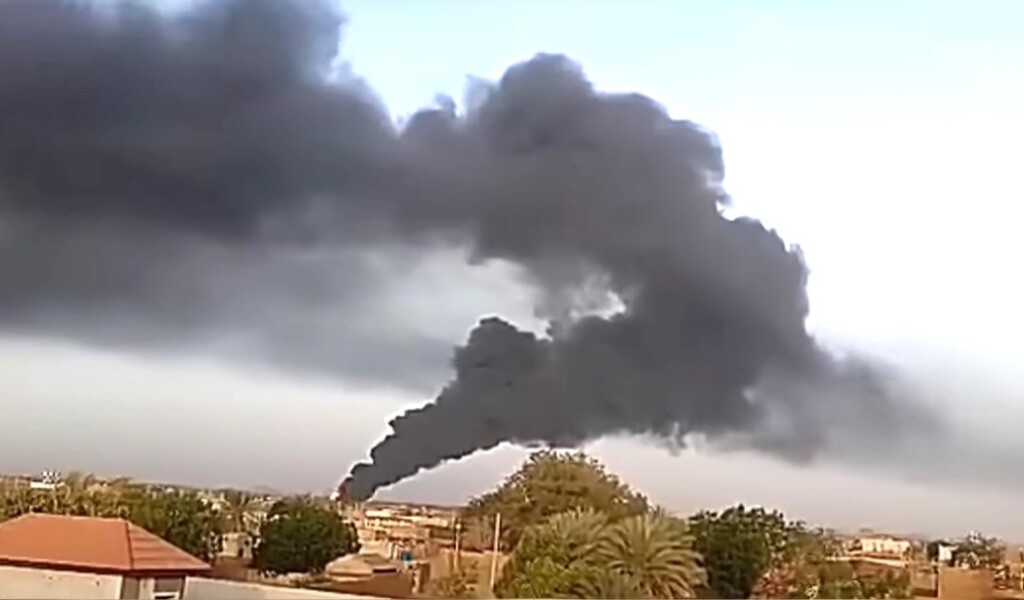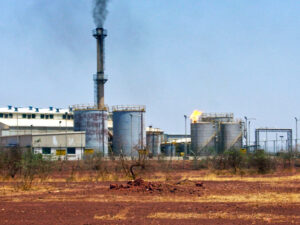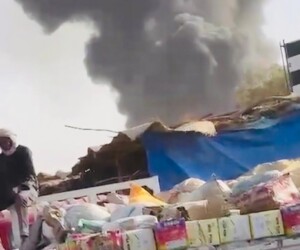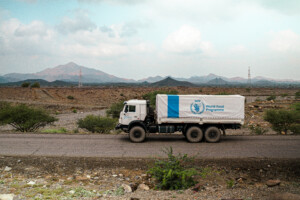Destruction of El Jeili Oil Refinery in Sudan ‘may lead to acid rain’

The El Jeili Oil Refinery, May 22 (Still from an RSF video posted on social media)
The bombing of the El Jeili Oil Refinery, northeast of Khartoum, on Tuesday night, will have disastrous consequences for the environment if action is not taken immediately, experts warn. Moreover, the loss of the refinery will lead to more fuel scarcities in the country.
Kamal El Tayeb, member of the board of directors of the refinery, told Radio Dabanga yesterday about the critical importance of the El Jeili refinery, the largest one in the country. A proportion of South Sudan’s oil, destined for export via Port Sudan, used to be refined in El Jeili as well.
Before war between Sudanese Armed Forces (SAF) and the paramilitary Rapid Support Forces (RSF) erupted in mid-April last year, the El Jeili Oil Refinery met 60 per cent of Sudan’s petrol needs, 48 percent of its diesel, and 50 per cent of its cooking gas, he stated.
The destruction of strategic storage facilities at the refinery poses a significant risk to the country, El Tayeb warned. “These facilities store petroleum materials used during maintenance or emergencies to prevent fuel shortages. Their destruction leaves Sudan more vulnerable to fuel scarcity, forcing reliance on imports, which are subject to currency fluctuations and irregular arrivals of fuel tankers.”
Toxins
Khaled El Ananze, former environmental engineer at the UN Mission in Sudan (UNMIS), stressed the need for a rapid environmental impact assessment of the airstrikes on the refinery.
“Oil refineries are always hazardous due to their flammable and toxic hydrocarbon materials. Any accident at the refinery can cause significant harm to the environment and human health,” he said.
“Emissions like sulphur dioxide from the bombardment can cause long term, cumulative problems in living beings and may form acid rain. The refinery’s hazardous substances could also pollute groundwater.”
Losses
El Jeili Oil Refinery is located 70 kilometres north of the capital, on the eastern side of the Atbara-Khartoum Road. Jointly owned by the Sudanese government and China National Petroleum Corporation (CNPC), it began its operations in 2000.
A few days after the war erupted last year, the RSF took control of the site. Seven months later, the Sudanese Air Force reportedly bombed the refinery.
On Wednesday morning, the RSF again accused the SAF of bombing the refinery. It was not clear whether the entire site was destroyed or two large fuel tanks only.
Economic analyst Kamal Karrar noted that day that the Sudanese Ministry of Petroleum estimated the oil sector’s losses within a year of the war’s outbreak at $5 billion. Karrar calculated that the losses from the aerial bombardments of the El Jeili oil refinery would be another $4 billion.











 and then
and then